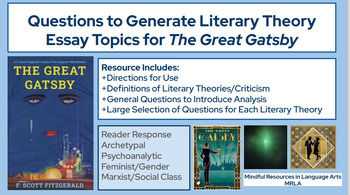Using Questions to Generate Literary Theory Topics for The Great Gatsby
- PDF
Description
Help your students understand 5 common Literary Theories/Criticisms through guided questions! This resource provides definitions, questions, thesis statements and outlines, and directions for use in your classroom.
This resource is designed to show how asking questions within the realm of each literary criticism/theory can result in an interpretation and understanding of The Great Gatsby that may not have occurred to students.
There are 12-20 example questions provided for Reader Response, Feminist/Gender Theory, Psychoanalytic Theory, Archetypal Theory, and Marxist/Social Class Theory within this resource. Essay outlines are included to support two questions and provide teachers with a model for making more.
I hope this resource will be a useful addition to your Gatsby unit! Please take a minute to leave positive feedback if it does and earn TPT points for your next purchase!





